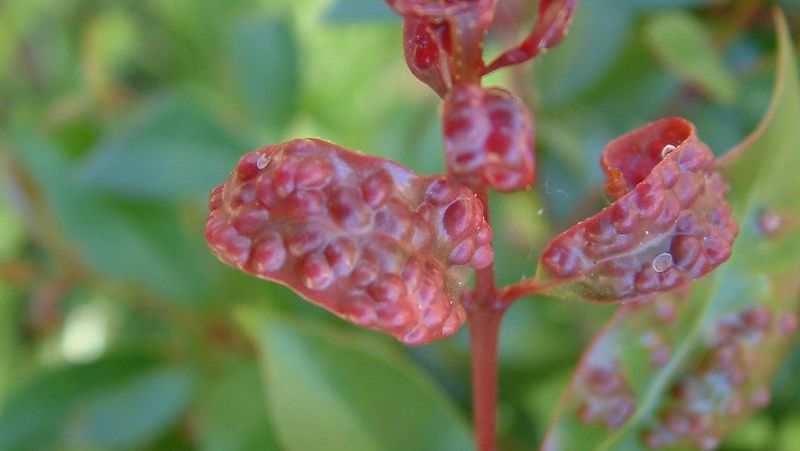Yates Account
Join now
Create a Yates account today!
Sign up to join the Yates Garden Club for monthly e-mails packed with seasonal inspiration, tips for success & exclusive promotions.
Plus if you’re a Garden Club member you can take part in the Yates Growing Community - a blog to share successes, get advice & win prizes in fun challenges along the way!

Forgot password
Enter the email address associated with your account, and we'll email you a new password.
Hemiptera / Psyllidae

What are Psyllids?
Psyllids are tiny sap-sucking insects that resemble miniature cicadas; you'll need a magnifying glass to see them properly. They're sometimes called 'jumping plant lice', due to their habit of hopping when disturbed. There are many different psyllid species; most of them are very specific about the host plants they feed on. There are about 50 native NZ species, including species that feed on griselinia and pittosporum hedges, along with the Pōhutukawa psyllid (which are responsible for the pimply-looking leaves commonly seen on pohutukawa trees).
There are two introduced pest species of psyllid in NZ that cause the most trouble to gardeners: one that targets vegetables and one that damages lilly pilly hedges and eucalypts.
The main species of concern for vegie gardeners is the Tomato-Potato Psyllid (Bactericera cockerelli) also known as TPP, which has a special attraction to plants in the Solanaceae family, so tomatoes, potatoes, capsicum, eggplants, chillies, tamarillo and kumara are all affected.
Both juvenile (nymph) and adult stages damage plants by piercing and sucking sap from the leaves. They're especially attracted to weakened or unhealthy plants, so psyllid infestations can have devastating effects on stressed plant hosts. Unfortunately, tomato/potato psyllids also carry bacterial disease in their saliva, that can be injected into the plant while they feed (Liberibacter disease is the cause of disfiguring 'zebra chip' disease in potatoes).
The most disappointing symptom of tomato-potato psyllid is getting tiny, inedible fruit at harvest time, for both tomatoes and potatoes.
The other challenging pest psyllid is the Lillypilly Psyllid (Trioza adventicia), which feeds on lillypillies and related plants in the Myrtaceae family. This psyllid causes unsightly warty-looking bumps on new leaves. In severe infestations plant health can be badly degraded, plus psyllids often transmit diseases to host plants while feeding.

Symptoms
A tomato-potato psyllid infestation can be hard to diagnose, because most of the symptoms are easy to mistake for other problems. Plants may become stunted, wilted, or develop yellow or purple upwards-curling leaves, often with purple leaf veins (the purple veins are a symptom of bacterial infection, which indicates psyllids may be the underlying cause).
A more obvious symptom is a white sugary crystalline substance appearing on leaves; this is actually honeydew excreted by the psyllids (also known as 'psyllid sugar', it might be accompanied by sooty mould). If you disturb the plant foliage and see tiny insects springing out, they will probably be tomato-potato psyllids.
If new leaf growth of lilly pillies is affected by bumpy, pimply-looking galls or pock marks, lilly pilly psyllids are the likely culprit. Leaves can be distorted or discoloured and terminal shoots often die back. Sooty mould grows on the crystalline honeydew.

How to protect your plants against Psyllids
- Yates Success Ultra concentrate is a very effective control for psyllids. This clever product is derived from fermented soil bacteria (Saccharopolyspora spinosa). The active ingredient (Spinetoram) has a translaminar action that enables it to move through the leaf from the upper to lower leaf surfaces, so it can kill difficult-to-access psyllid nymphs hiding on the underside of leaves.
- Psyllids take advantage of weak and stressed plants: Yates Thrive Natural Seaweed Tonic is a great tool to reduce plant stress.
- Help your plants to stay healthy by keeping the soil moist and feeding them regularly with Yates Dynamic Lifter Organic Plant Food.
- Psyllid resistant varieties of lilly pillies are available for hedging.

Plants impacted
- Tomatoes
- Potatoes
- Lilly Pilly
- Capsicum
- Eggplant
- Chillies
- Tamarillo
- Kūmara
- Kōwhai
- Pittosporum
- Griselinia
- Pōhutukawa
- Lancewood
- Eucalypts















Share
Share this article on social media